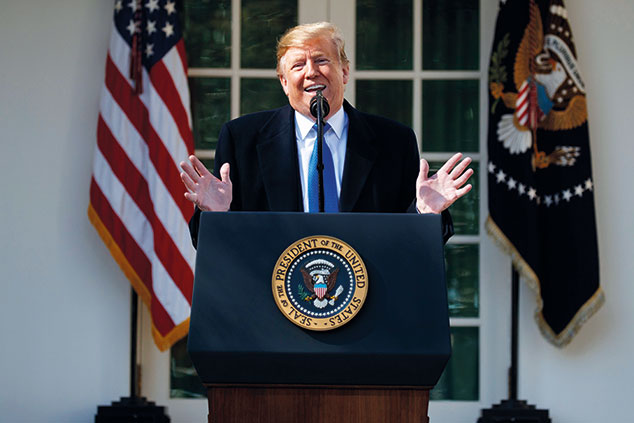
“Desperate to save face,” President Trump “cooked up” a declaration of national emergency last Friday, which he claims gives him the power to win funds for building 230 miles of border wall, says The New York Times. Trump’s plan is to use the pretext of an emergency at the Mexico border to seize $2.5bn from the military’s drug interdiction programme, $3.6bn from military construction and $600m from the Treasury Department’s drug forfeiture fund. In doing this, the administration “is thumbing its nose at Congress, the Constitution and the will of the American people, the majority of whom oppose a border wall”.
Trump isn’t the first US president to declare an emergency, as most presidents “have sought ways around the powerful gatekeeping role of Congress”, says David Charter in The Times. President Ronald Reagan, for example, infamously tried to bypass Congress to fund the Contra rebels in Nicaragua; President Harry Truman temporarily nationalised steel mills in 1952 to ensure production for the Korean War.
But Reagan’s attempt was considered illegal and the Supreme Court struck down Truman’s gambit. In any case, “no US leader has ever tried to use the act to seize the resources he wants for a domestic project after failing to convince Congress to vote for it”.
Legal challenges could scupper Trump’s plan
Trump’s power grab is unlikely to pass unchallenged, says The Washington Post. Indeed, it has already “been beset with political and legal challenges”, with Democrats claiming it is “evidence of a rogue president who has finally gone too far”. Even many Republicans have “expressed disapproval”, arguing that the move will “set an undesired precedent” and “deprive other projects of necessary funds”.
Opponents of the move are likely to follow a “two-pronged” strategy – getting Congress to vote to reject it in the coming weeks and suing Trump (or at least aiding other parties that attempt to intervene).
Don’t count on the judges, says Cass Sunstein on Bloomberg. Even if Trump’s own statements and actions contradict the need for his action, the courts “are not likely to rule that Trump’s declaration of a national emergency is itself unlawful”. The legality of it “will probably turn on highly technical provisions involving the use of funds for military construction projects”. We must distinguish between an action that is, “in some technical sense, unlawful”, says Sunstein, and one that is “in some fundamental sense illegitimate in a democratic society”. While the declaration is clearly illegitimate, it’s not necessarily unlawful.
A “springboard” into 2020
Even if the Supreme Court or Congress ultimately blocks Trump’s move, this might not be the end of the matter, says the FT. Indeed, it is possible that Trump actually wants the US courts to throw out his plan to give him a “springboard” to run against “meddling judges and politicians” in 2020. Not only would the slogan “the people against the system” have a nice “Trumpian ring to it”, but it would also ensure that Trump “continues to dominate the conversation”. Still, that is “no reason to let him act with impunity”.